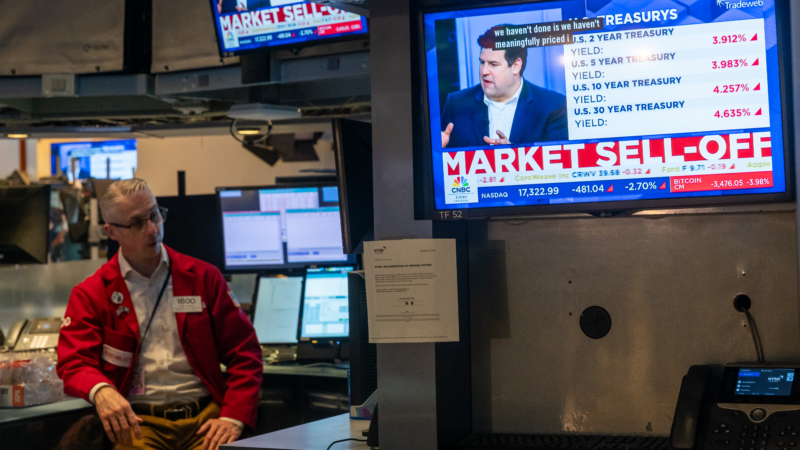Dow drops 1,500 points on trade war fears over new tariffs
President Trump’s sweeping tariff announcement Wednesday triggered a sharp drop in U.S. stock markets, a flashing-red warning sign of the economic fallout that’s expected to result from the widening trade war.
The Dow Jones Industrial Average tumbled over 1,500 points, or 3.6%, Thursday within minutes of the opening bell. The broader S&P 500 index sank over 4% and the tech-heavy Nasdaq index dropped nearly 5%.
Overseas markets were also down. Japan’s Nikkei index fell 2.8% overnight while South Korea’s Kospi benchmark dropped 1.1%.
Trump has ordered a minimum, 10% tax on nearly all imports starting this weekend, with much higher tariffs on goods from dozens of countries, including some of the United States’ closest allies. Imports from the European Union will face a 20% tariff, while Japanese goods will be taxed at 24%.
Imports from Canada and Mexico are spared the additional tariffs, for now.
Economists warn the new taxes will result in higher prices and slower growth in the United States, while likely pushing many other countries into recession.
The tariffs amount to a nearly nine-fold increase in the prevailing U.S. import tax last year. The size and scope of the levies, announced after the U.S. stock market closed on Wednesday, took many investors by surprise.
“This is a game changer, not only for the U.S. economy but or the global economy,” Olu Sonola of Fitch Ratings wrote in a research note “You can throw most forecasts out the door, if this tariff rate stays on for an extended period of time.”
Stocks of companies that rely on imports are among the hardest hit. Apple lost 9% of its value, while Nike shares fell 13% and Amazon dropped 7%.
Just as Trump tried to build a wall against illegal immigration during his first term in the White House, he’s now erecting an economic barrier against global trade, in an effort to restrict imports and encourage domestic manufacturing.
“We’re going to produce the cars and ships, chips, airplanes, minerals and medicines that we need right here in America,” Trump said Wednesday in the White House Rose Garden. “They’re all coming back to our country because if they don’t, they’ve got a big tax to pay.”
But while domestic manufacturers are supposed to be the beneficiaries of the trade war, many factories are bracing for higher costs and a loss of export markets. Trading partners have already promised to retaliate with tariffs of their own on U.S. exports.
“Here it comes and we’re already seeing that,” said Tim Fiore, who conducts a monthly survey of factory managers for the Institute for Supply Management. “The retaliatory tariffs are going to be really ugly. It’s just going to kill demand.”
Trump argues that his new tariffs are simply designed to match the trade barriers that other countries impose on U.S. exports. But the White House acknowledged, it would be too hard to calculate the actual trade barriers in each foreign country. So officials just picked a number they thought would be high enough to eliminate each country’s trade surplus with the U.S.
The result is a whopping 34% tax on imports from China (on top of the 20% tariffs Trump already imposed), and a 46% tariff on goods from Vietnam. Many factories moved from China to Vietnam to escape Trump’s earlier tariffs.
The U.S. launched a similar, worldwide trade war in the 1930s. It did not end well. The notorious Smoot-Hawley tariffs are widely thought to have worsened the Great Depression.
“It was bad for consumers, because it meant higher prices,” says former Treasury Secretary Larry Summers. “It was bad for producers, because it meant higher input costs. And it was bad for peace, because it undermined comity among nations.”
Economists say Trump’s new tariffs are even more draconian, hitting even products the U.S. is unable to produce domestically, such as coffee and bananas.
Dozens presumed dead in fire at Swiss Alps bar during New Year’s celebration
Dozens of people are presumed dead and about 100 injured, most of them seriously, following a fire at a Swiss Alps bar during a New Year's celebration, police said Thursday.
Crypto soared in 2025 — and then crashed. Now what?
For most of 2025, cryptocurrencies such as bitcoin surged as President Trump vowed to make the U.S. a crypto leader. But now, a severe sell-off has shaken the sector.
Warren Buffett officially retires as Berkshire Hathway’s CEO
The legendary 95-year-old investor spent decades building his company into one of the world's largest and most powerful. Now Greg Abel is taking it over.
Zohran Mamdani sworn in as New York City mayor, capping historic rise
Mayor Zohran Mamdani took the oath of office in New York City after midnight Thursday. The city's first Muslim mayor, a member of the Democratic Socialists of America, has promised to focus on affordability and fairness.
Rising from the ashes, a symbol of hope at the Rose Parade
Survivors of the Eaton and Palisades Fires find healing and community working on a Rose Parade float to honor the lives and communities lost in last year's wildfires.
The history behind the NYC subway station chosen for Mamdani’s swearing-in
The city shut down the station in 1945 on New Year's Eve. Eighty years later, it's a symbolic venue choice for the incoming mayor's private swearing-in ceremony.







